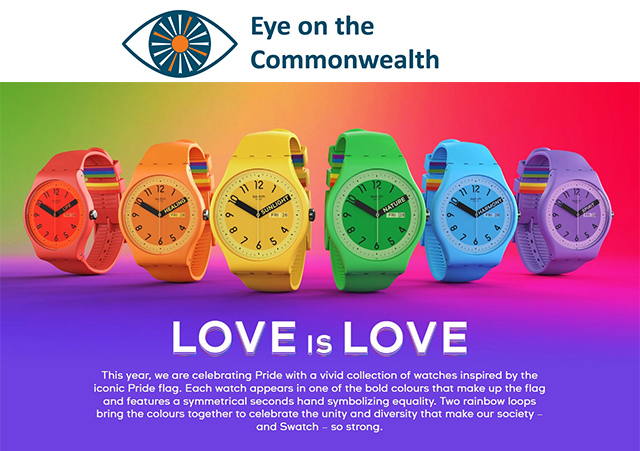 Swiss firm Swatch went to court in Malaysia over the seizure of its rainbow-coloured
watches celebrating LGBTQ+ rights. [photo: Swatch]
Swiss firm Swatch went to court in Malaysia over the seizure of its rainbow-coloured
watches celebrating LGBTQ+ rights. [photo: Swatch]
The fluctuating status of lesbian, gay, bisexual, transgender, queer and other rights around the Commonwealth is a useful barometer of the health of all human rights: if LGBTQ+ people are suffering or hiding, then it’s likely that other people in that country are fearful of the regime, or the conservative and religious forces that support their oppression.
In a measure of positive outcomes for LGBTQ+ communities in recent weeks, the British government apologised for gay and lesbian personnel being forced out of the military; Australian censors refused to restrict access to Gender Queer, a controversial US memoir by a non-binary writer; and a married lesbian couple who launched a legal test case against the NHS won a ‘victory for equality’ in England, Wales and Northern Ireland by forcing a change in fertility treatment rules for same-sex couples.
On the downside, the Swiss firm Swatch went to court in Muslim-majority Malaysia – where homosexual acts are punishable by 20 years in prison – over the seizure of rainbow-coloured watches that celebrate LGBTQ+ rights. And the government there shut down Kuala Lumpur’s three-day Good Vibes music festival last week after a simple, if provocative, kiss on stage by two men in the British band The 1975. After the kiss – and criticism from the stage of Malaysia’s anti-gay laws by the singer, Matty Healy – the band were banned. Fahmi Fadzil, communications minister, warned: ‘Never touch on the sensitivities of the community, especially those that are against the traditions and values of the local culture.’
Is the Commonwealth Stonewalling on LGBTQ+ Rights?
The new law fuelling anti-gay hatred in Uganda is Museveni’s ‘dead cat strategy’
Human Rights, Sexual Orientation and Gender Identity in the Commonwealth: Struggles for Decriminalisation and Change
Gender nonconformity
Malaysia is one of only a few countries in the world to make gender nonconformity a criminal offence. It also criminalises consensual same-sex conduct at both the federal and state levels. ‘Government officials have fostered a hostile climate in which LGBT and gender-diverse people face discrimination and punishment because of their sexual orientation or gender identity,’ Human Rights Watch (HRW) said last year.
Intolerance of Malaysia’s LGBTQ+ community has increased in recent years as Islamist forces have grown in power. Last year 20 people at a Halloween party were detained after a police raid and accused of violating Islamic bans on ‘cross-dressing’ (they were in costumes), as well as ‘encouraging vice and indecent acts in public places’. Numan Afifi, an LGBT rights activist who was arrested, called it ‘outrageous state oppression’.
The government is particularly harsh towards anyone it sees as challenging its own idea of gender roles. In 2021 the government tried to extradite Nur Sajat, a transgender woman, from Thailand to face criminal charges of ‘insulting Islam’ because of how she dressed.
‘Homophobic agenda’
While one might expect the local LGBTQ+ community to have welcomed a bold, public challenge to repressive laws, the widespread fear in the face of such an oppressive government and police action led even a Malaysian drag queen, Carmen Rose, to criticise Healy and warn of the consequences for the local LGBTQ+ community of his ‘white saviour complex’. With Malaysia’s state elections nearing, Rose said: ‘It gives them [conservative politicians] more ammo to further their homophobic agenda to gain votes.’
A recent global survey of trans rights put Malaysia second from bottom in the world, better only than another Commonwealth country, Guyana. The Caribbean country shares Malaysia’s range of discriminatory laws, its ban on changing legal gender and making cross-dressing illegal, but pips it to last place because it also has high murder rates of LGBTQ+ people. According to the survey, nine of the worst 20 countries for trans rights are in the Commonwealth, though the best is also a member state: Malta, which was the first country in the EU to add gender-identity protections to its constitution and ban ‘conversion therapy’. Other member states in the bottom 10 are Malawi, Tonga and Nigeria, with the Gambia, Brunei, Uganda and Rwanda in the next 10 worst.
‘Eye on the Commonwealth’ columns look at current issues facing the Commonwealth
Find out more about the Commonwealth Round Table and the Round Table Journal
Malaysia’s increasing repression of LGBTQ+ people is in stark contrast to Singapore, which finally decriminalised gay sex last year by repealing Section 377A of its colonial-era penal code. To appease conservative and religious forces, the secular but pragmatic city-state simultaneously passed a constitutional amendment emphasising marriage as between man and woman to forestall demands for same-sex weddings.
Nevertheless, even if Singapore’s move was largely one made for practical reasons rather than out of any moral principles, it is still a step in the right direction. As Malaysia hurtles backwards to an Islamist future, it would do well to look to its more successful neighbour.
Oren Gruenbaum is a member of the Round Table editorial board.



